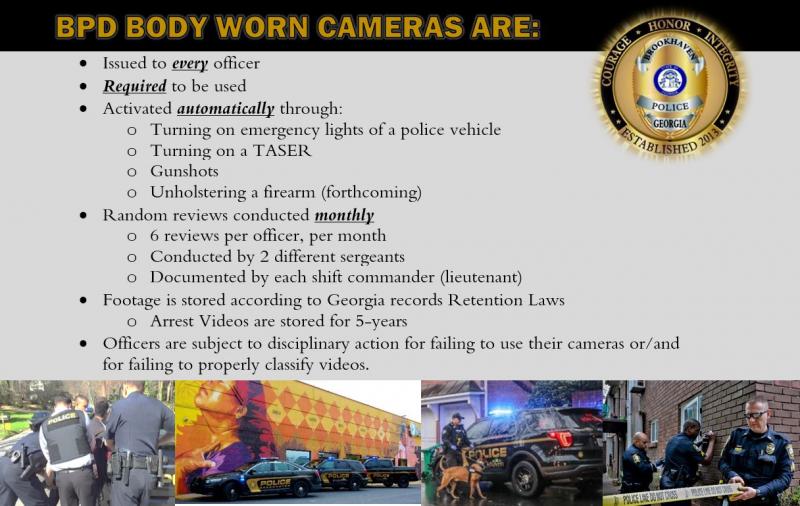Body Worn Cameras
At our inception in 2013, the Brookhaven Police Department outfitted every officer with a dash-mounted camera and body-worn microphone. Beginning in 2016, BPD began equipping officers with body-worn cameras, and the devices have been mandatory for our officers since July 2017.
BPD officers are required to activate their body-worn cameras anytime they have a professional interaction with a member of the public. This includes: calls for service, traffic stops, and reports taken by telephone. BPD cameras are always recording. When the camera is activated, the device preserves the video footage from 30-second *prior* to the activation; audio recording begins the moment a camera is turned on. This “pre-record” feature enables a more complete view of an event, especially those situations that arise quickly or unexpectedly such as an officer happening upon a dispute or witnessing a traffic law violation.
In addition to manually activating the cameras, the BPD body-worn an in-car cameras have several automatic triggers that begin a recording. Body-worn cameras have a built-in gunshot detector that turns the camera on at the sound of gunshots within audible range. Additionally, BPD officers are equipped with TASERs which, when turned on, activate every body camera nearby. BPD was the first agency to contact our camera vendor to install a device on our gun holsters that will turn on the body camera anytime an officer pulls his or her gun from the holster. We have enough of these devices to outfit every officer, and are waiting on the vendor to produce a bracket for our holsters. We expect these to be installed by December 2020. Separately, activating the emergency lights on our police cars also automatically turns on the dash-mounted and body-worn cameras.
Each officer is responsible for classifying every recording he or she makes with a case or event number and the reason the recording was created – even if accidental. Every month, each sergeant reviews three videos for every officer on his shift. With two sergeants on every shift, this means that every officer is subjected to six random video reviews by two separate supervisors every month. These periodic checks are designed to ensure that officers are complying with standards of conduct, rules and regulations, and properly using their body camera devices. Officers who are not in compliance are subject to disciplinary action.
Video retention periods vary in accordance with Georgia records-retention laws. Arrest videos are retained for a minimum of five years.

